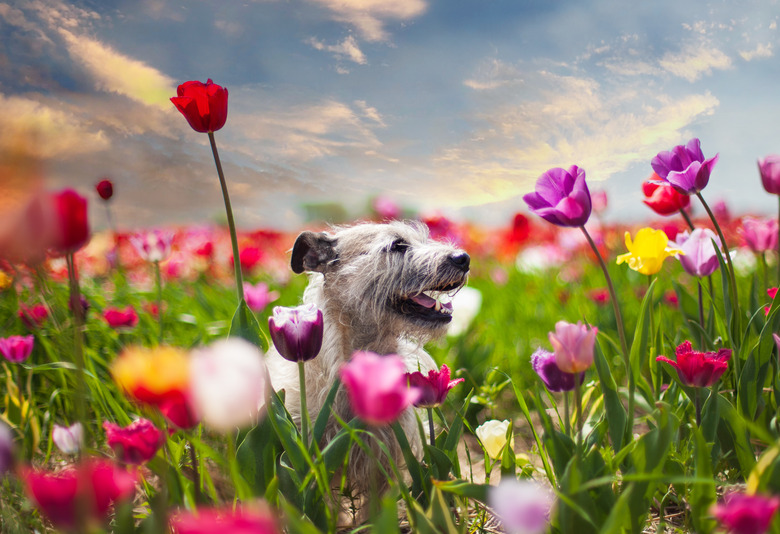Are Tulips Poisonous To Dogs?
We may receive a commission on purchases made from links.
Are tulip bulbs poisonous to dogs? If your pooch considers your flower bed its personal vending machine, that question can play havoc with your peace of mind, especially if your dog is a digger. Whether Punxsutawney Phil predicts an early or late seasonal arrival, tulips (Tulipa) and other spring bulbs will emerge promptly according to their own schedule. Whenever that might be, one thing doesn't change — tulip bulbs are toxic to dogs, making for a potentially dangerous combination.
These colorful and often stunning herbaceous perennials thrive best in U.S. Department of Agriculture plant hardiness zones 3a through 8a, typically blooming from April through May.
Tip
While the tulip's toxin is mild compared to those of many other ornamentals, the danger is still there, and tulip bulbs and dogs just don't mix well. Even a little taste of tulip tissues produces irritation of a dog's esophagus and mucous membranes, with ingestion of larger amounts producing symptoms that vary in severity to some as extreme as coma and death.
Tulip Toxicity to Dogs
Tulip Toxicity to Dogs
The tulip, a member of the lily family, contains toxic glycosides known as Tulipalin A, Tulipalin B, and Tuliposide A. These substances are present in all parts of the plant, with the highest concentration being in the bulbs.
Ingestion of small amounts of tulip foliage, stems, and flowers causes vomiting, depression, diarrhea, and excessive drooling. Eating larger amounts, including bulbs — the most toxic part of the plant — causes increased respiratory rate, difficulty breathing, cardiac arrhythmias, increased heart rate, abdominal pain, tremors, and coma. Death may also occur.
What To Do if Your Dog Ate Tulip Bulbs
What To Do if Your Dog Ate Tulip Bulbs
Confine the dog away from the tulips, examine the animal closely, and look for any signs or behavior that appear out of the ordinary. Try to figure out which materials were ingested and how much. Was it foliage only or bulbs and foliage? Take a few minutes to think clearly to form a good estimate.
Call your pet's veterinarian immediately. The vet will need to know what and how much was ingested as well as your dog's age, breed, weight, and general health. The vet will also ask about your pet's current medications and underlying health conditions, and will use this information to determine the degree of poisoning your dog is experiencing. You will be advised to either rush your pet into the office or merely monitor the dog closely at home.
The treatment your vet prescribes will depend on when the dog ate the material, the dog's weight, and how much was ingested. If the dog ate tulip bulbs, the vet may induce vomiting, administer supportive fluid therapy, and insert an IV catheter. More severe tulip poisoning may require hospitalization and oxygen therapy. There is no antidote for tulip toxins.
Know the Risks
Know the Risks
Just because you wouldn't eat a particular item, remember that your dog rarely sees things in the same light. You won't eat a tulip, but dogs see no reason not to. Learn the characteristics of every plant you own if your best friend could possibly come in contact with it. Be able to identify any substance that can pose a danger to your pet in case of typical doggy behavior, such as ingestion, and know the correct action to take if this occurs.
Restrict Your Pet's Access to Tulips
Restrict Your Pet's Access to Tulips
If you bring cut tulips into your home, position the vase so your dog has no way to possibly reach it. Your outdoor situation may prove to be a bit more challenging. If your buddy has access to plantings, never take your eyes off the dog while you're in the yard together. If you let your pet out alone, create barriers, such as invisible fencing or decorative walls, between the dog and the toxic plants. Pet-repelling products, such as invisible fencing and electric fencing, are readily available online or from your local home improvement retailers.
Tip
If you even think that your pet has eaten a substance that may be poisonous, call your veterinarian immediately. If you can't reach your vet, contact the ASPCA Animal Poison Control Center at (888) 426-4435. Don't wait, even if you're in doubt, because your precious friend's life may depend on your rapid action. The Pet Poison Helpline can also be reached at (800) 213-6680. Each of these facilities is available to you 24/7, 365 days every year, and both charge a service fee.
Warning
All spring bulbs should be considered poisonous to your dog.
Always wear sturdy gloves when you handle tulips, particularly the bulbs. The toxins in these plants can irritate your skin and produce a painful, itchy rash called "tulip fingers," sometimes suffered by florists.
